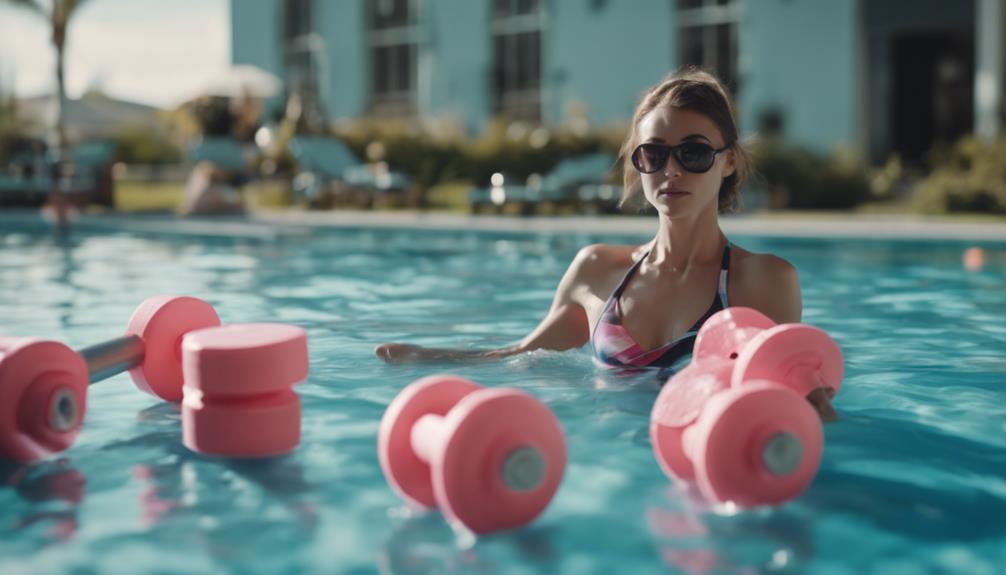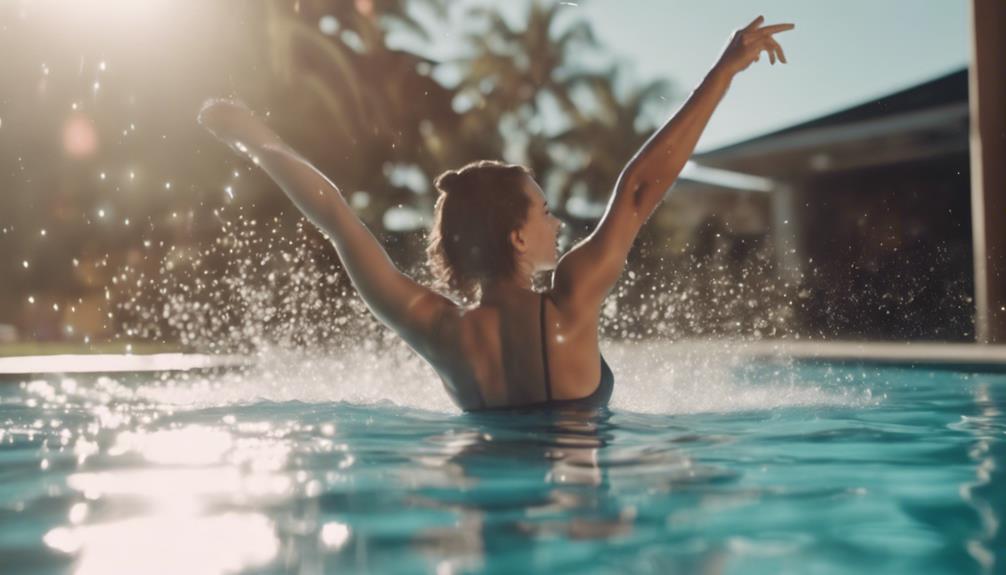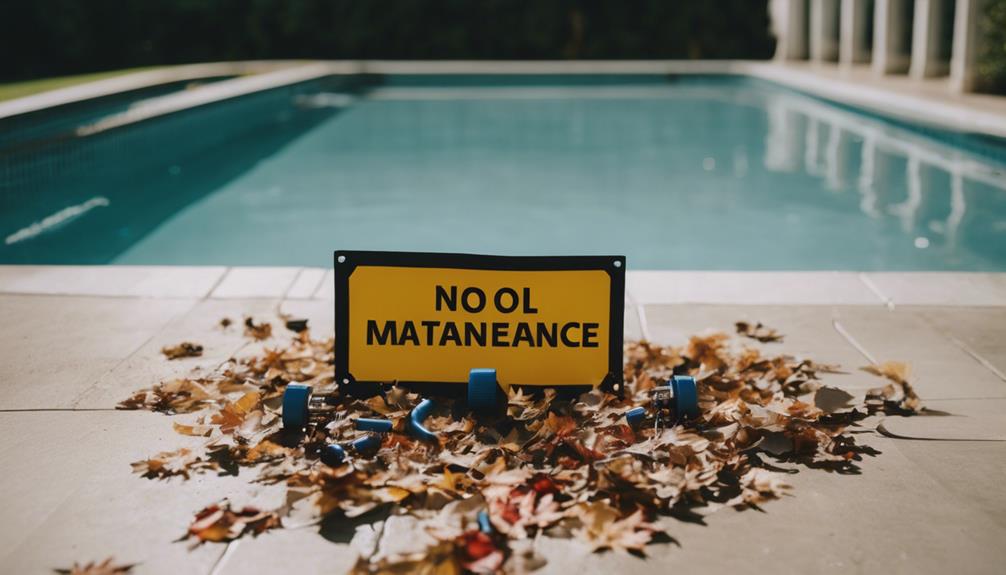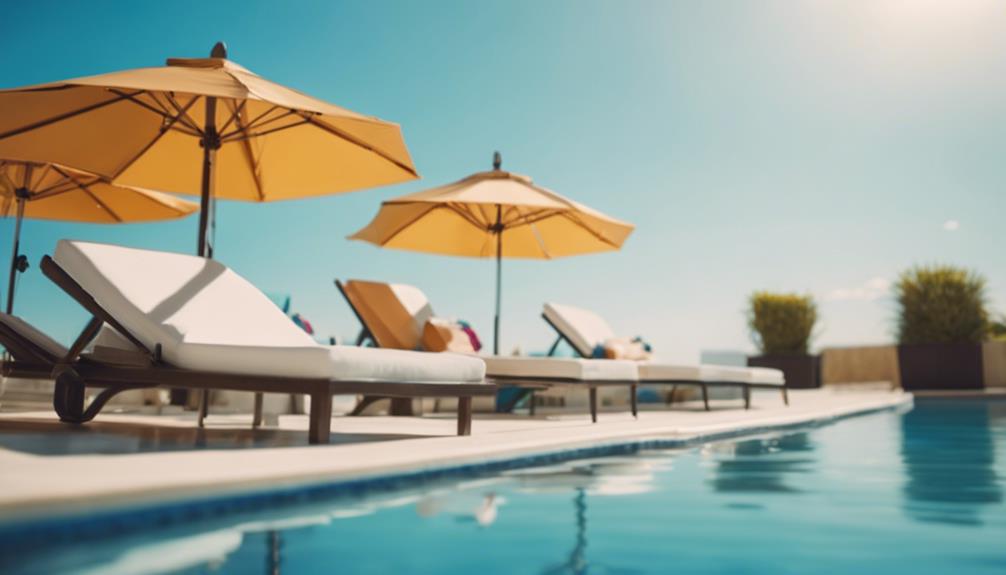Explore the advantages of poolside workouts with aquatic exercise. Aquatic workouts provide a gentle way to enhance muscle strength and cardiovascular health. Options such as swimming laps, water aerobics, and aqua jogging offer a comprehensive workout suitable for all fitness levels. Key recommendations involve perfecting swimming skills, beginning slowly, and staying well-hydrated. Conquer obstacles by experimenting with different exercises and ensuring pool safety. Start by acquiring fundamental strokes, breathing methods, and escalating intensity gradually. Immerse yourself in the realm of aquatic fitness for a productive and pleasurable method to maintain fitness and well-being.
Key Takeaways
- Swimming laps and water aerobics offer full-body workouts with low impact.
- Aqua jogging and resistance bands enhance endurance and intensity.
- Master basic swimming techniques for effective poolside workouts.
- Join group classes and try new exercises to keep workouts engaging.
- Prioritize safety measures and follow pool rules for a secure environment.
Benefits of Aquatic Exercise
The advantages of engaging in aquatic exercise are numerous and encompass a wide range of health benefits. Water-based workouts provide a low-impact environment, making them ideal for individuals recovering from injuries or managing pain.
The resistance of water also forces muscles to work harder, promoting muscle strength and endurance. Additionally, aquatic exercise is beneficial for cardiovascular health, improving overall well-being.
This form of exercise is particularly suitable for individuals with arthritis or joint-related issues, as it allows for movement without excessive strain on the joints. By engaging in aquatic exercise, individuals can enjoy a full-body workout that is not only effective but also enjoyable, making it a great option for those looking to stay active and healthy.
Poolside Workout Options
Exploring different aquatic workout options by the poolside offers a diverse range of fitness activities to engage in and enjoy.
Swimming laps is a classic choice that challenges the cardiovascular system and engages various muscle groups simultaneously.
Water aerobics, incorporating rhythmic movements with water resistance, provides a fun and effective full-body workout.
For those looking to burn calories and build endurance, aqua jogging is a great option.
Additionally, utilizing tools like kickboards and resistance bands can enhance the intensity and effectiveness of poolside workouts.
Whether you prefer a leisurely swim or high-intensity training, poolside exercises cater to a wide spectrum of fitness levels and goals, making it an inclusive and enjoyable way to stay active.
Essential Tips for Water Exercises

Effective engagement in water exercises requires adherence to essential guidelines to optimize safety and performance. To guarantee a successful aquatic workout experience, consider the following key tips:
| Essential Tips for Water Exercises | |
|---|---|
| 1. Master fundamental swimming techniques | 4. Stay hydrated |
| 2. Utilize functional swimwear | 5. Celebrate progress |
| 3. Begin slowly and increase intensity gradually |
Overcoming Challenges and Safety Measures
To navigate potential obstacles and guarantee a secure workout environment, individuals engaging in water exercises must proactively address challenges and prioritize safety measures. When participating in aquatic fitness activities, it is essential to:
- Combat Boredom: Trying new exercises and joining group classes can keep workouts engaging and exciting.
- Ensure Pool Safety: Always swim in designated areas, adhere to pool rules, and be cautious of weather conditions and potential hazards.
- Seek Professional Guidance: Qualified instructors can provide valuable insight on proper technique, reducing the risk of injury and enhancing the effectiveness of your workout routine.
Getting Started With Aquatic Fitness

Beginning a water fitness journey involves familiarizing oneself with basic swimming techniques and safety precautions. Before diving into water workouts, mastering essential strokes like freestyle, breaststroke, backstroke, and butterfly is necessary.
Understanding proper breathing techniques and body positioning also plays a vital role in maximizing the benefits of aquatic exercise. Safety precautions such as staying within designated swimming areas, using flotation devices if needed, and being aware of pool depth are crucial for a safe and enjoyable experience.
Additionally, starting slowly and gradually increasing the intensity of workouts is key to preventing injuries and building endurance. By taking these initial steps, individuals can set off on a rewarding aquatic fitness journey that promotes physical health and overall well-being.
Frequently Asked Questions
Can I Do Aquatic Exercises if I Don't Know How to Swim?
Yes, you can partake in aquatic exercises even if you don't know how to swim. Options like water aerobics, aqua jogging, and using water resistance tools provide low-impact workouts beneficial for overall fitness and well-being.
Are Poolside Workouts Suitable for All Fitness Levels?
Poolside workouts cater to all fitness levels by offering a versatile range of activities from gentle water aerobics to vigorous lap swimming. With proper guidance and gradual progression, individuals of various abilities can benefit from aquatic exercise.
What Types of Swimwear Are Recommended for Water Exercises?
For water exercises, opt for functional and comfortable swimwear. Choose suits that provide flexibility, support, and durability. Look for materials that dry quickly and offer UV protection. Proper swimwear enhances performance and comfort during aquatic workouts.
How Often Should I Engage in Aquatic Workouts for Best Results?
For best results, engage in aquatic workouts at least 3-4 times per week. Consistency is key to reaping the benefits of low-impact exercises. Gradually increase intensity to challenge your body and improve cardiovascular health, strength, and endurance.
Is It Necessary to Join a Group Class for Water Aerobics?
While joining a group class for water aerobics can enhance motivation and social interaction, it is not necessary. Individualized workouts can still be effective. Consider personal preferences, goals, and comfort levels to determine the best approach.
Conclusion
To sum up, aquatic exercise offers a plethora of benefits for individuals of all fitness levels. Whether you prefer swimming laps, water aerobics, or aqua jogging, poolside workouts provide an invigorating and effective way to stay active and enhance overall well-being.
By following essential tips, overcoming challenges, and prioritizing safety, you can confidently immerse yourself in the transformative world of aquatic fitness.
So, jump in and make a splash with these invigorating water-based workouts!










